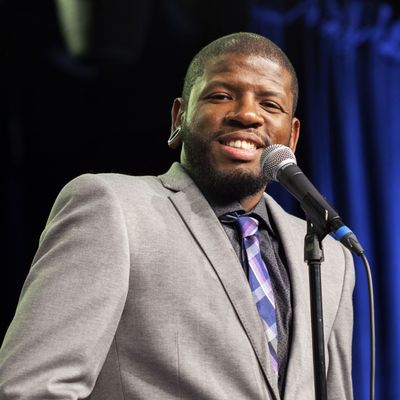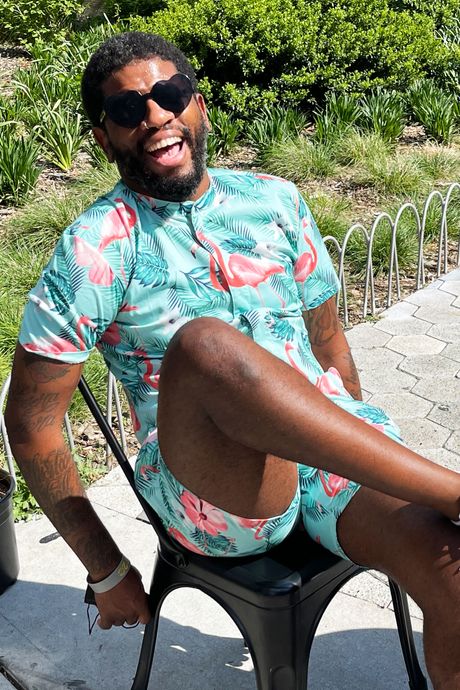
In 2015, when Seattle-born comedian Quincy Jones, born Quami Wallen, was diagnosed with stage IV peritoneal mesothelioma and told by doctors he had one year to live, he was best known for his peculiar choice of stage name (he shares no relation with the famous music producer) and for performing 1,000 shows in a single year to strengthen his chops as a comedian. How unfair, it seemed, that he had put himself through this grueling exercise only to die before he had anything to show for it.
In 2016, Jones’s friends Nicole and Mickey Blaine launched a Kickstarter campaign to change this. They set a goal to raise $5,000 so Jones could film a comedy special and immortalize his life’s work. Remarkably, it succeeded. The campaign went viral on social media, capturing the attention of Ellen producers, who invited Jones on the show twice: on March 15, 2016, to raise awareness of his Kickstarter, gift him $10,000, and call on networks to air his special, and on March 21 to surprise him with the news that HBO had signed on to do so. “You’re lying!” Jones bellowed at Ellen DeGeneres in disbelief, overjoyed at the reveal.
On June 2 of that year, Jones’s 32nd birthday, HBO aired his special, Burning the Light, to a smattering of fanfare and positive reviews. It should have been Jones’s swan song — a good, if understandably imperfect, hour balancing topical jokes about Jones’s condition with a series of observational riffs tackling everything from the injustice of police brutality to the incompetence of Subway. But then something improbable happened: Jones kept on living.
“I didn’t think I was gonna die in a year,” Jones explained to me over Zoom just two months ago. “I was insulted that they thought that after everything I’d been through in my life, I was just gonna throw in the towel and let cancer have its way.”
It turns out Jones was right to be indignant. Five years later, he’s still alive and fighting as part of a community of terminal patients who have had the uniquely awkward experience of preparing to die only to watch their preparations become redundant. For some, tearful good-byes are made anticlimactic by subsequent years of mundane interactions. For others, shortsighted spending sprees wipe out retirement savings that wind up being necessary after all. In Jones’s case, he lived out his dying wish of recording a stand-up special, but then his condition stabilized and people stopped laughing.
“It’s a solid special,” Jones says, reflecting on Burning the Light prior to the fifth anniversary of its release. He qualifies that he had just two weeks to put it together, that the recording was the first time he had performed an entire hour while ill, and that he had been pressured by his then-managers to integrate material about dying while the subject was still too raw. But he maintains that he’s happy with the way the special epitomizes his legacy. “I can stand on it,” he says.
Despite Jones’s belief that he would defy the odds, Burning the Light was written and conceived as a way for him to hedge his bets in preparation for the worst. The hour’s final joke — “Keep the cure, [I’ll take] more Ellen money” — functioned as more than a closer to his set; it was a resignation to his fate. If Jones had died after this recording, he could have done so peacefully, knowing he had performed up to his standards while the spotlight was on. Instead, the special marked the start of a tumultuous and confusing saga in his life, during which his joy at surpassing his doctors’ estimates was tamped down at every turn by speculative accusations that he had fabricated his cancer diagnosis for career opportunities — opportunities which, by the way, quickly dried up.
Not long after Jones shouted “You’re lying!” at DeGeneres on daytime TV, strangers — including comics like Ari Shaffir and Amanda Seales — were shouting similar accusations about him all over social media. In July 2016, Seales sent out a subtweet saying, “N - - - - Z IS REALLY OUT HERE LYIN BOUT THEY CANCER THO?!” (She later walked this back in a subsequent tweet, clarifying, “No one said he’s faking cancer. They questioned its terminal status.”) In 2019, Shaffir made an appearance on the “Jim Norton & Sam Roberts” radio show, where he declared confidently that Jones had staged the entire thing, offering little more as proof than his anecdotal observation that Jones hadn’t lost his beard during chemotherapy. “There was never any proof,” Jones says, reflecting on the accusations. “It was just completely out of the blue.”
Of course, Jones had his share of defenders in the comedy community, too — people like Greg Edwards, who sent out a tweet in July 2016 saying, “If you’re hating on my Man @LLQJ206 & think hes faking CANCER, U are sad & lonely.” (Jones’s former Twitter account was suspended in 2020 after, according to him, he threatened a racist who had invaded his mentions to attack a Black woman and himself. Pressed for more details, Jones says the incident took place over a year ago and he can’t remember. He’s now on Twitter at @ThaQuam.)
The longer Jones lived past his initial timeline, the more fervent the rumors became. Eventually, the speculation grew so vicious it started affecting his dating and professional lives. “You know how many girls I’ve been talking to who’ve asked me about Reddit threads their friends have shown them?” he asks angrily. “I had to go on the “Jim & Sam” show in 2019 to show receipts of my cancer. I should never have had to do that!” The “receipts” included thick stacks of medical paperwork as well as an on-air consultation with a doctor who quizzed Jones to assess his credibility. The show’s initially skeptical hosts were eventually forced to concede that Jones was telling the truth.
Even more bizarre than this development, however, is the fact that Jones predicted it would happen in the opening bit of Burning the Light, one of the special’s funniest stretches. Given the series of events that have unfolded since then, it just feels surreal:
“The reason we’re doing this is because I had a dream of making a stand-up special. We set a meager goal of $5,000 [on Kickstarter], but because of your guys’ love and support in the comedy community, we blew past that and we went to $50,000. But now I feel pressure, and the expectations are high … and I feel pressure to die. I can’t live longer than three years with this shit. You blow that far past your goal, they expect a great special and a casket. I can’t be the Magic Johnson of cancer. N - - - - s will be like, ‘Is he really sick? I don’t know.’ ‘I understand the HBO special … but it’s been five years! I think it’s his time.’”
Prescience aside, there are inherent limitations to trying to sustain a comedy career on the back of this sort of material. If you introduce yourself to the world at large by telling them that doctors think you’re going to die soon, there’s a good chance people will think you have fulfilled that prediction. A joke later in the special about how Jones had trouble dating with his prognosis (“Define long-term relationship”) doubles as an explanation for why managers and bookers didn’t start reaching out to him about future opportunities the way you might expect given his well-received HBO special. Jones continued to book stand-up gigs and high-profile podcast appearances for a little while, but eventually his buzz tapered off.
In the five years since Burning the Light first aired, Jones has had to contend with this fallout. While it seems he has finally put to bed the rumor that he had faked his illness, he’s now trying to rebuild his comedy career from the ground up.
“I had to step away from comedy for a bit,” Jones explains. “My agent disappeared, and my manager and I split. Once the steam stopped, it was back to being by myself. I’ve been learning different elements: writing sketches and pilots and shows and submitting packets. Doing the same thing I’d be doing if I didn’t have credits.”
With this clean slate, however, Jones seems to have developed a much healthier outlook on comedy than he had before. Five years ago, he stared down his mortality, and he says it didn’t make him approach comedy with a greater sense of urgency because, as an aspiring comedian, he “had that mentality for years.” Today, he can refocus his efforts away from stand-up toward a new day job as a pharmacy technician, and he’s going back to school to get his M.S.W./J.D. He isn’t conflicted about taking time away because, he says, “I was a comedian before, I’ll be a comedian after, and I’ll be a comedian always.”
Looking toward the future, Jones is excited to get back into performing stand-up post-pandemic. The events of the past five years have given him a newfound perspective that he thinks will lead to some inspired material. “I got to see the best side of humanity and the worst side,” he explains.
Over Zoom, Jones workshops some of the jokes he plans to use in his next special — an hour called Still Here, which he hopes to self-produce and self-release in August — about the cartoonish level of villainy and absurd logistical prowess he would have needed to successfully fake cancer. It’s funnier and more incisive than a lot of the observational humor in Burning the Light.
As for Jones’s health, he receives chemotherapy treatments every six weeks and continues to hope for the best. When people express surprise at the frequency, he rolls his eyes and quips, “Ellen didn’t absolve me of cancer, bro.”



